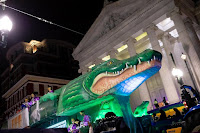We're inching ever closer! Coastal Crimes, Volume II: Death Takes a Vacation is more than just a vision at this point. We've gathered submissions and are completing our internal review and making edits. Soon, we'll ship the manuscript off to Wildside Press, for another round of edits and formatting changes. This are exciting times as we approach the home stretch for our anticipated late winter/early spring 2024 release date.
True to our by-the-sea vibe, this next anthology features short stories by some of your favorite local authors, centered around a common theme: mysterious deaths involving a vacation destination in the Coastal Plain of Virginia or North Carolina east of Interstate-95.
More details to follow, including a cover reveal, when the time is right. Stay tuned!




.jpg)



